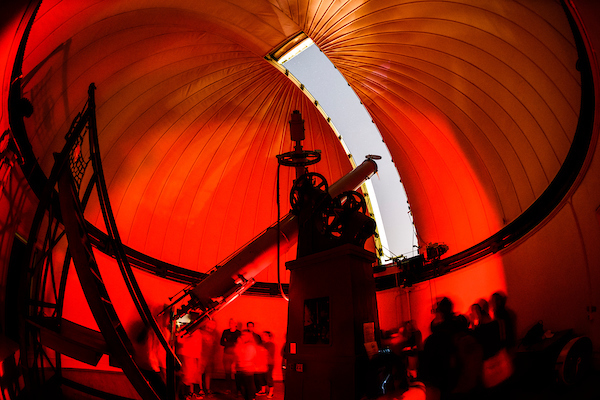Science Expeditions invites public to campus April 5–7

If the spring night sky cooperates, Washburn Observatory’s telescope will be open to all Friday night during Science Expeditions. Photo: Jeff Miller
Dive underwater to explore Wisconsin’s forgotten mines. Peer up at the heavens and survey the night sky. Or discover the life and legacy of Wisconsin’s famed naturalist, Aldo Leopold.
Or pick all three. It’s your choice how to kick off this year’s Science Expeditions, the University of Wisconsin–Madison’s annual open house that invites the public to explore all facets of science, medicine and technology across three days of free events. From Friday, April 5, to Sunday, April 7, Science Expeditions offers dozens of exploration stations, tours, presentations, hands-on activities and more.
“It’s part of our public service mission to welcome people to their public land-grant research university, not only over the three days of the open house, but throughout the other 362 days of the year,” says Tom Zinnen, an outreach specialist at UW–Madison’s Biotechnology Center and the Division of Extension, and a UW Science Expeditions organizer. “We hope it resonates and reverberates around the year that people are welcome here.”
The weekend starts at 5 p.m. on April 5. Wisconsin Public Radio host Ruthanne Bessman will demonstrate the link between math and form with her origami presentation at the Discovery Building, 330 N. Orchard St., at 5 and again at 7 p.m. Stick around between the shows for talks on how personalized medicine can improve health treatments.
Also on Friday, the Hasler Laboratory of Limnology, 680 N. Park St., and the Arthur H. Robinson Map Library on the third floor of Science Hall, 550 N. Park St., will be open starting at 5 p.m. And the Special Collections room on the ninth floor of Memorial Library, 728 State St., will showcase two exhibits, including one on Leopold’s legacy of environmental consciousness and another on high-tech analysis of documents from the Middle Ages.
Friday evening ends with a presentation by the Wisconsin Historical Society’s Tamara Thomsen, an underwater archaeologist who will share her findings from flooded mines across the state, in the society’s auditorium at 816 State St. at 7:30. And if the spring night sky cooperates, Washburn Observatory’s telescope will be open to all at 1401 Observatory Dr. after 7:30.
On Saturday, the center of action is the Discovery Building, where some three dozen exploration stations will offer hands-on activities from 10 a.m. to 2 p.m. Nearby, the Geology Museum in Weeks Hall, 1215 W. Dayton St., exhibits billions of years of Earth’s history. And the L.R. Ingersoll Physics Museum demonstrates dozens of physical laws with interactive exhibits in Room 2130 of Chamberlin Hall, 1150 University Ave.
If you’re looking for signs of spring, head to the Botany Greenhouse and Herbarium in Birge Hall, 430 Lincoln Dr., or the D.C. Smith Greenhouse, 465 Babcock Dr., to take in both local and exotic plants between 10 a.m. and 2 p.m.
And for the second year in a row, Saturday also coincides with the Engineering Expo, a free day of events centered along Engineering Drive, just across from the Discovery Building in the center of campus.
“To be able to have the whole central campus open to folks by partnering with the Engineering Expo is a splendid thing and says a lot about the collaboration that we do here really well,” says Zinnen.
On Sunday, the health sciences schools offer an opportunity for the public to “Explore the Science of Health” with more than three dozen exploration stations, shows, and tours of the UW Clinical Simulation Center, a pediatric cancer immunology lab in the Wisconsin Institutes for Medical Research, and a compounding lab in the School of Pharmacy. These west campus sites are open starting at noon at the Health Sciences Learning Center, 750 Highland Ave. (School of Medicine and Public Health), Signe Skott Cooper Hall, 701 Highland Ave. (School of Nursing), and Rennebohm Hall, 777 Highland Ave. (School of Pharmacy).
Also on Sunday, the biennial School of Veterinary Medicine open house takes place from 10 a.m. to 3 p.m. at 2015 Linden Dr. The year’s theme is “Big and Small: We Treat Them All,” and visitors are invited to interact with animals of all stripes and learn how the school researches and teaches lifesaving procedures. To learn more about animals on campus, head to the Dairy Cattle Center, 1815 Linden Dr., for tours at the top of every hour from 10 a.m. to 1 p.m.
You can end the weekend with a tour of the natural, geological and human history of Picnic Point, including a survey of the Native American mounds that still reside in the natural preserve. Start near Lot 129, 2004 University Bay Dr., from 2 to 3:30 p.m.
Other activities include:
- Explore the universe’s most mysterious particles — neutrinos — with hourly shows at the Sterling Hall Planetarium, 475 Charter St., on Saturday from 11 a.m. to 2 p.m.
- Visit the Ruth Davis Design Gallery in Room 1210 of Nancy Nicholas Hall, 1300 Linden Dr., for a showcase of the School of Human Ecology’s nationally renowned textile collections from noon to 4 p.m. on Saturday and Sunday.
- Tour the Wisconsin Energy Institute, 1552 University Ave., at 1 or 2 p.m. or visit its exploration stations from noon to 3 p.m. on Saturday.
- Walk the grounds of the Arboretum from 12:30 to 4 p.m. on Sunday starting at the Visitor Center, 1207 Seminole Hwy.
For a complete list of events, maps, parking information and more, visit the Science Expeditions website at science.wisc.edu/science-expeditions.
